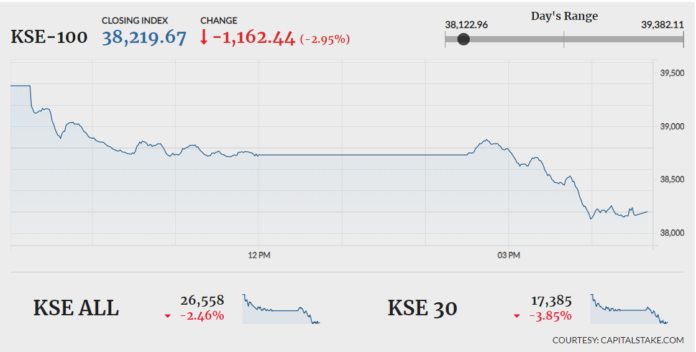KARACHI: In line with global market trends, the Pakistan Stock Exchange (PSX) witnessed a lacklustre session on Friday, with the KSE-100 nosediving over 1,200 points intraday amid rising coronavirus concerns.
Foreign investors remained net sellers in the previous session (Thursday), registering a net outflow of $3.18 million.
On the economic front, Pakistan’s total foreign exchange reserves remained flat at $18,869 million (as on Feb 28, 2020). The reserves previously stood at $18,743 million (on Feb 21, 2020). Net reserves held by the State Bank of Pakistan increased 1.32pc while net reserves with commercial banks declined $39 million.
Shedding 1,259.15 points, the KSE-100 Index recorded its intraday low at 38,122.96. It finally settled lower by 1,162.44 points at 38,219.67 after failing to find any positive trigger.
Among other indices, the KMI-30 Index lost 2,341.38 points to end at 60,180.29, while the KSE All Share Index dropped 670.94 points, closing at 26,557.85. Out of the total traded shares, 65 advanced and 237 declined.
Sectors that drove the benchmark index south included banking (-362.26 points), oil & gas exploration (-243.12 points) and fertilizer (-154.55 points).
The overall market volumes declined from 340.72 million in the previous session to 244.06 million, with Maple Leaf Cement Factory Limited (MLCF -0.78pc), Fauji Cement Company Limited (FCCL -3.41pc), Pioneer Cement Limited (PIOC -1.34pc) and DG Khan Cement Company Limited (DGKC -0.33pc) topping the volume chart. The scrips had exchanged 27.25 million, 25.87 million, 22.31 million and 14.59 million shares, respectively.
The oil & gas exploration sector turned out to be the top loser of the day, shedding 4.69pc in its cumulative market capitalization. Oil and Gas Development Company Limited (OGDC -6.54pc), Pak Petroleum Limited (PPL -6.05pc) and Pakistan Oilfields Limited (POL -4.92pc) all closed in the red.




